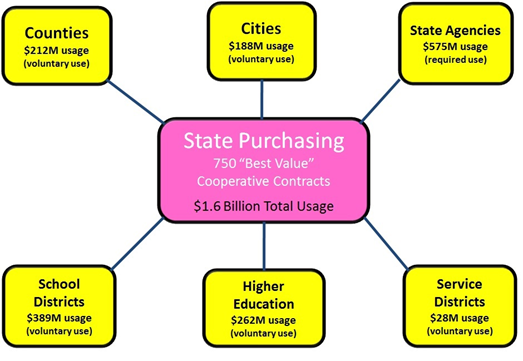The Division of Purchasing provides a centralized purchasing function for all state agencies. Purchasing manages hundreds of Statewide "Best Value" Cooperative Contracts that are used by state agencies, education, and local governments. The value of these contracts to all public entities in the state is represented by more than $1.6B in spending for Fiscal Year 2014. Two-thirds of the reported spend is accounted for through purchases made by non-state public members of the cooperative. Furthermore, the division is the Issuing Procurement Unit for state agencies exceeding a combined 3,000 contracts and solicitations that value more than a billion dollars annually.
During the 2015 General Session, the Legislature appropriated for Fiscal Year 2016, $653,700 from all sources for Purchasing. This is a 3.5 percent increase from Fiscal Year 2015 revised estimated amounts from all sources. The total includes $653,700 from the General/Education Funds, an increase of 3.5 percent from revised Fiscal Year 2015 estimates.
In addition to statewide compensation and internal service fund cost increases, the following appropriation adjustments were made during the 2015 General Session:
State Purchasing Cooperative Contracts
State Purchasing manages more than 700 Statewide "Best Value" Cooperative Contracts that are utilized by state agencies, institutions of higher education, school districts, and local governments. Usage of the contracts is mandatory by state agencies, but voluntary by political subdivisions. Thus political subdivision usage of the contracts is a barometer of whether the contracts provide best value.

In 2011, the Utah Legislature authorized the Division of Purchasing and General Services' Purchasing Section to transition to an Internal Service Fund (ISF). Through the legislatively-authorized implementation of an administrative fee of up to 1% on the over 700 Statewide "Best Value" Cooperative Contracts procured and managed by the Section. The transition is complete with all personnel being approximately 75% ISF and 25% appropriated. This section represents the work performed under the 25% budget appropriation to the Purchasing Section.
Dedicated Credits are generated by contract management cost reimbursements. The division participates in and manages several multi-state contracts for the Western States Contracting Alliance (WSCA) -- a contracting alliance of fifteen western states. Utah has the lead on data communications, small package delivery, and other types of contracts.
COBI contains unaudited data as presented to the Legislature by state agencies at the time of publication. For audited financial data see the State of Utah's Comprehensive Annual Financial Reports.